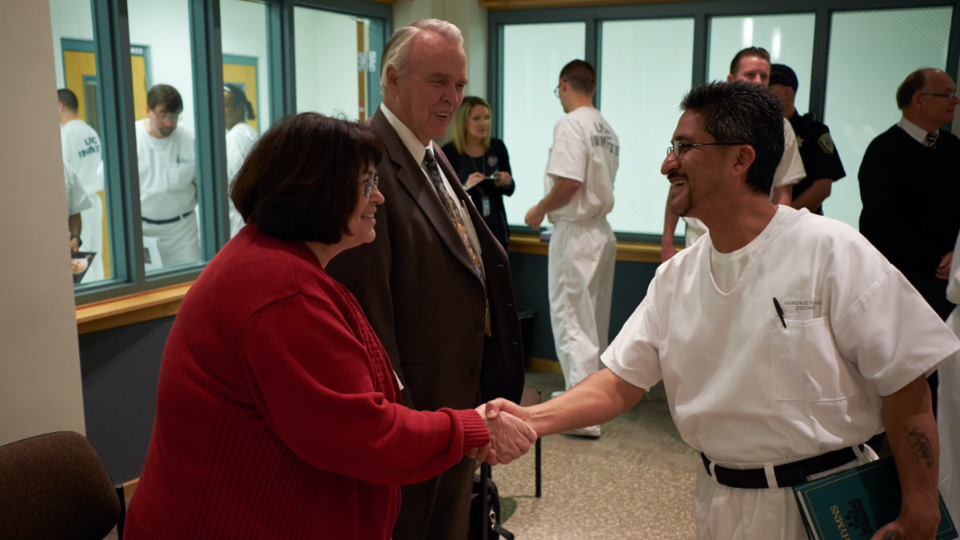| An incarcerated man says the prayer during a Sunday worship service. 2020 by Intellectual Reserve, Inc. All rights reserved. | 1 / 6 |
The sister missionary with The Church of Jesus Christ of Latter-day Saints Prison Ministry group gently unfolded the handwritten letter from Robert, an incarcerated man who had recently started attending worship services provided by the Church. “I am working to repent and bring my life in line with God’s plan,” he wrote. “I may not know each step I have to make, but I am determined. This is hard and painful, but I will not waste Christ’s Atonement.”
Like so many adults in custody, Robert has been positively affected by the Church’s Prison Ministry efforts, which officially began in the Salt Lake Valley during the 1990s. Today, the program encourages individuals of all faiths and background who are in custody to come unto Jesus Christ as they attend worship services, study the scriptures and develop supportive relationship with local Latter-day Saints.
The Prison Ministry group in the Church’s Priesthood and Family Department seeks to provide adults in custody with Church resources and gospel lessons and a connection to local Church leaders for ongoing support. Through personal scripture study and prayer, handwritten letters from prison ministry workers, personal relationships with ecclesiastical leaders and positive interactions with members of the Church, many incarcerated men and women experience a change of heart and character and connect with God for the first time.
Inside the Prison Ministry
Full-time senior missionary Sister Sue McNamara said she is grateful for the opportunity to work with the Prison Ministry group because she has seen the impact it can have on individuals who are often forgotten.
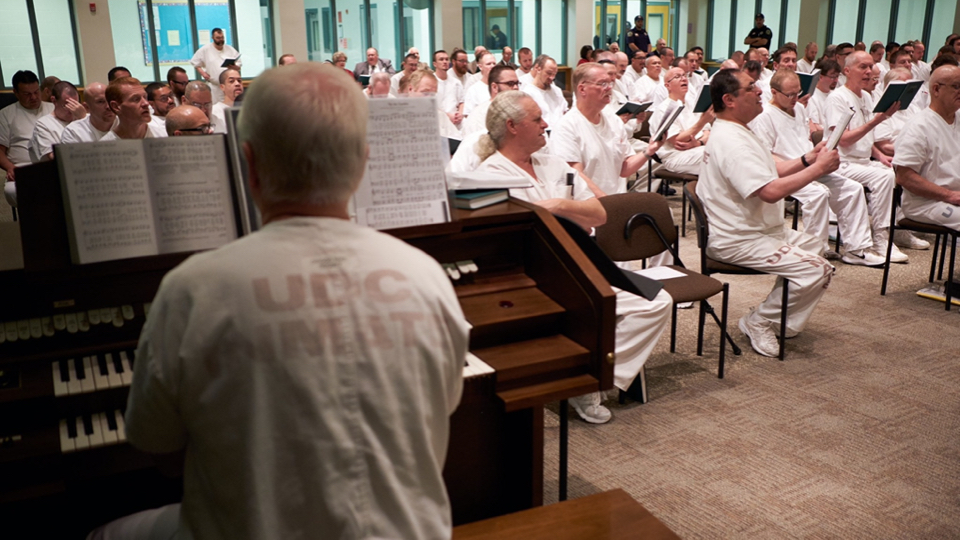
Victors Story 3
Inmates sing hymns together during their Sunday worship service at a correctional facility. (This photo was taken before COVID-19 restrictions.) 2020 by Intellectual Reserve, Inc. All rights reserved.McNamara’s and the other missionaries’ main responsibility is to read and reply to letters from adults in custody who write to the Church to request religious materials and reconnect with the Church of Jesus Christ. While some of these letters are written from members of the Church who are currently residing in prison, many of the letters are from individuals who have recently discovered the Church’s teachings and want to learn more.
McNamara said that more than anything, these individuals are often looking for a lifeline of hope.
“Within the Prison Ministry group, we read each letter and understand what materials they are asking for. We write back to them and often include other inspiring materials that might be helpful based on what they are saying,” McNamara said. “We like to write words of encouragement and things that will give them further hope. We remind them that they are all children of God — no matter their crime.”
The combined efforts of Church members and the Prison Ministry group have proven to be source of hope for the hopeless and a positive reminder of second chances for all of God’s children. The letters remind incarcerated people that they are all worthy of a kind response and can benefit from the Savior’s all-encompassing Atonement.
McNamara said that when she explains her 18-month service to others, she generally receives the same response in several phases: “The first is, ‘That sounds scary and terrifying,’ and then after examples of the amazing responses we get in letters, they have a different perspective. They want to help with the work.”
McNamara said one of the most beneficial things members of the Church can do is to establish a safe and trusted relationship with an adult in custody. For some, a kind and supportive letter can change a person’s life — like it did for Victor Robinson.
Victor Robinson

Victor's Story 4
The first and only picture of Victor Robinson's childhood as a newborn baby. All rights reserved.Victor was 13 years old when he first entered a juvenile detention center. As the fourth oldest of eight half-siblings, Victor felt he had a responsibility to provide rations for his brothers and sisters however he could. Unfortunately, more times than not, that resulted in dumpster diving or stealing.
“We didn’t have milk. We didn’t have cereal. We didn’t have food,” Victor said. “My older brother and I would go steal at a grocery store, and we would get caught.”
Victor spent his entire teenage life, from the age of 13 to 18, being transferred to different facilities. When he turned 18, he transitioned to an adult prison.
“I just thought that to be the norm,” Victor said of the constant cycle of committing a crime and re-entering incarceration. Absent parents and gang-related activities made matters worse. His negative outlook increased when Victor found out while he was imprisoned that his older brother had been murdered.
“It sent me on a downward slope,” he said of his brother’s death. The tragedy propelled Victor to more violence and a lack of self-worth. He recalled that he reached a point where he didn’t even recognize himself in the mirror: “There was nothing there — just an empty vessel full of hate.”
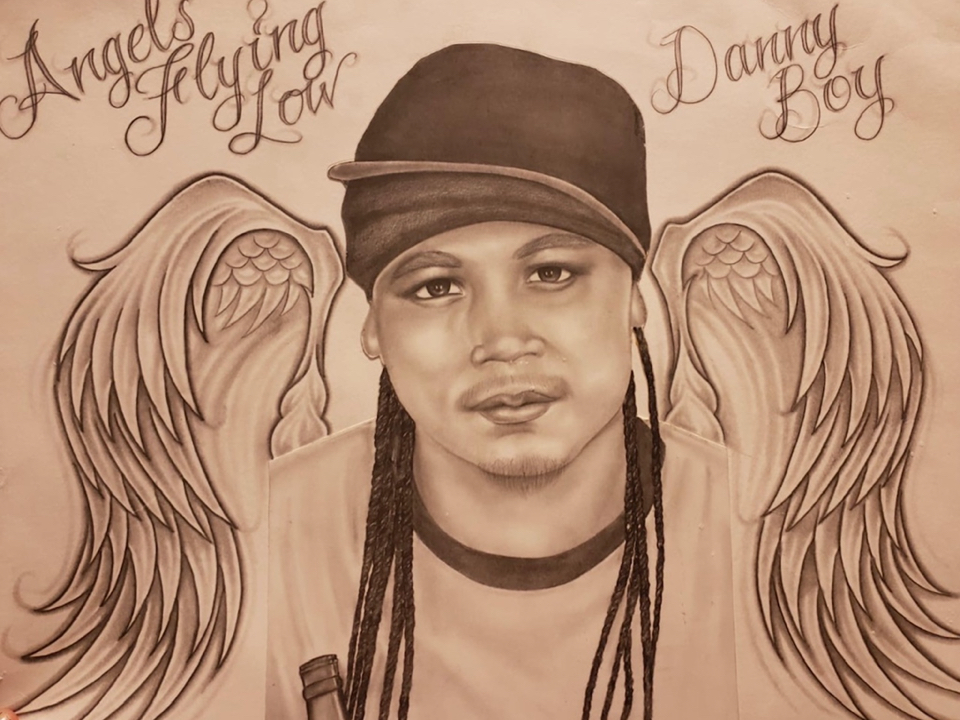
Victor-3-copy.jpg
An original sketch of Danilo Caraan, Victor Robinson's half-brother. Victor drew this after Danilo's murder. Victor said he is eager to baptize his brother as soon as he is able to. Photo Courtesy of Victor RobinsonA different emotion would eventually replace Victor’s hate. One afternoon, a female officer patrolling the prison yard collapsed with heat exhaustion. Victor caught her body before it hit the ground and called for help. Later, the prison gang he was affiliated with, accused him of not following its cruel rules. Instead of listening to the harsh external voices around him, Victor experienced an innate desire to turn his life around and leave the violence, gangs and hatred behind. “At that point, I just wanted to do my time and live a normal life,” Victor said.
It was then that Victor began searching for religion — an idea that had never occurred to him before. Luckily, it was also during this time when Ashley Park felt the need to reach out.
Member Connections
Ashley grew up near the East Bay of Northern California, where she met her soon-to-be best friend, Danilo Caraan. When Danilo was murdered, Ashley decided to reach out to his younger brother Victor, an inmate serving time in a California correctional facility. When Victor received Ashley’s letter, he couldn’t believe his eyes. It was the first form of communication he had received since being incarcerated as a teen.
“It touched me,” Victor said. “I couldn’t believe there was somebody who actually cared enough about me to see how I was doing.”
After months of correspondence, Ashley encouraged Victor to attend the Sunday meetings of The Church of Jesus Christ of Latter-day Saints that occurred inside the prison walls. She had grown up as a member and felt the meetings would benefit Victor while he served his time. Little did she know how fast he would embrace the truths of the gospel.
“Once I had this enlightenment from the Lord, I began to see everything differently,” Victor said. “It’s changed me in a way that I could never go back to the person that I was."
With the help of the correctional branch president and many others, Victor began absorbing the teachings. He read the Book of Mormon, taught multiple Sunday School lessons and recognized an internal change in himself. He became so enthralled with the gospel that some of his questions even stumped Ashley.
“I was reading every night,” Victor said. “I read about 15 different books from the Church of Jesus Christ — I was intrigued and motivated to learn more.”
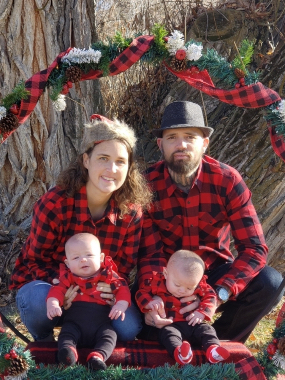
Victor-2-copy.jpg
Ashley and Victor Robinson pose with their newborn twin girls, Leilani and Johanne, for a family picture during the 2020 Christmas season. All rights reserved.Victor said he knew the gospel of Jesus Christ was true after he read the Book of Mormon and saw distinct changes in himself and in the lives of others. Some of those changes included reimagining a better future, reducing his incarceration time and marrying his newfound love, Ashley.
Victor finished serving his sentence and has been married to Ashley for five years. The couple, who reside in Utah, recently had twin daughters — Johanne and Leilani — who Victor said are the light of his life. He said he is doing everything he can to ensure that his daughters have what he didn’t — a childhood.
The couple began a vinyl-screening baby clothing shop, and they are patiently waiting for Victor’s parole to be up so he can be baptized. Victor said he is excited to make this covenant with the Lord and looks forward to baptizing his deceased brother in the temple and his daughters when they come of age.
“I continue to thank God for the second chance that I was given and for Ashley’s example to me,” Victor said.
Second Chances
While many might see Victor’s story as unique, Doug Humble, the recently released branch president of the Soledad California Correctional Branch, said he has seen these miraculous changes in the lives of many adults in custody.
“I have witnessed mighty changes of heart,” Humble said. “As they start to understand that God loves them and that there are people who want them to succeed, there is a physical change, as well as a spiritual one — it’s an amazing difference.”
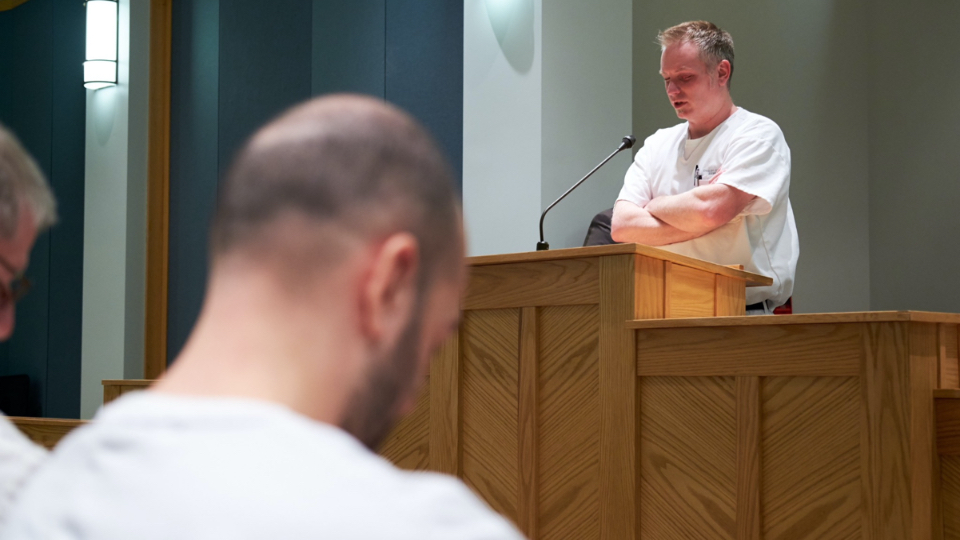
The changes in inmates’ lives are often reflected in the personal testimonies they share on Sundays. “Every single testimony is about the Atonement and Jesus Christ,” Humble said. “Many tearfully thank the Lord and have the desire to change. They all admit that they are closer to God than ever before.”
Humble said his most significant role was to remind each individual that he is loved, and that Heavenly Father knows him. This connection gives incarcerated adults greater light, life and hope for the future — especially when, for some, this is the only connection they have felt for a long time.
“It’s just heartbreaking,” Humble said. “There are individuals who have been in custody for decades and they haven’t gotten any letters, any visits — anything. Those that do have some outside connection are way better off.”
He continued, “In Matthew 25 we are commanded to go visit our brothers and sisters in prison, and we’re supposed to be like Christ.” While not everyone can physically visit correctional facilities, Humble said all members can do better at understanding the depth and breadth of the Atonement and that it applies to everyone, even (or especially to) adults in custody. This is easier, he said, with a willingness to understand their background stories.
“Some of these individuals just never had a chance to succeed,” Humble said. “There are some who are incredibly addicted to something or had no chance because of abuse in the home. And it’s incredible to see them come out and find hope, faith and repentance.”
Humble said he is grateful to Ashley, her family and other members in their congregation who have provided friendship, connection and unconditional love to Victor as he has accepted and flourished in the gospel of Jesus Christ. He said he hopes that more ecclesiastical leaders and members will remember the expansiveness of the Atonement and listen to the whisperings of the Spirit.
To learn more about the responsibilities of those called in the Church’s prison ministry system, visit Providing Support for Those in Correctional Facilities. For additional information about the Prison Ministry group and how to help, email prisonministry@churchofjesuschrist.org. Read more articles about incarceration in the February 2021 Liahona.
